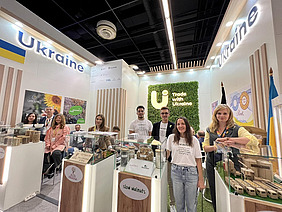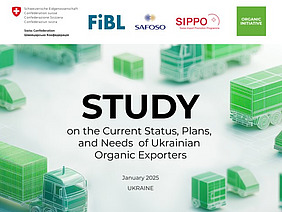Despite the severe disruptions caused by Russia's full-scale invasion, Ukraine's organic exporters are showing remarkable resilience in sustaining their operations and access to international markets. This is one key takeaway from the study "Current State, Plans and Needs of Ukrainian Organic Exporters", conducted in December 2024 – January 2025 by the Organic Initiative Public Association (Ukraine) in partnership with the MZ HUB research agency, with support from FiBL and other organisations.*
As part of the study, 91 out of approximately 150 Ukrainian organic exporters were surveyed. The findings reveal a sector under immense pressure, yet showing strong adaptability. Despite the war, 70 percent of the surveyed organic enterprises continued exporting in 2022. Most exporters retained their organic certification and traceability standards. The study also confirms growing exports and strong interest in expanding to both new and established markets.
Challenges on multiple fronts
45 percent of the surveyed enterprises reported a decline in export volumes, mainly due to logistics disruptions. Furthermore, damaged infrastructure and blocked ports forced costly detours. Financial liquidity is under pressure due to delayed payments and rising costs, and many companies face workforce shortages, as employees have been displaced or mobilised for military service. Certification and compliance also became more complex: exporters must now prove not only organic integrity but also reliability under crisis, facing stricter audits and buyer demands.
Opportunities and future growth
Despite these and further challenges, international demand for organic products from Ukraine remains strong. Support from development agencies such as SECO (Switzerland's State Secretariat for Economic Affairs) and technical partners like FiBL has also proven crucial, helping exporters build resilience through training, certification support, and matchmaking with buyers.
With continued support and innovation, Ukraine's organic export sector is well-positioned to not only recover but also become more sustainable and competitive. Coordinated efforts to remove border barriers, optimise logistics chains, and help exporters enter new markets will be critical in shaping a resilient organic economy that can withstand future shocks.
Further information
Contact
Link
drive.google.com: Study "Current State, Plans and Needs of Ukrainian Organic Exporters"
About the study
*The Study "Current State, Plans and Needs of Ukrainian Organic Exporters" was conducted in by the Organic Initiative Public Association (Ukraine) in cooperation with the MZ HUB research agency with the support of Switzerland within the framework of the Swiss-Ukrainian Programme "Higher Value Added Trade from the Organic and Dairy Sector in Ukraine" (QFTP) implemented by FiBL in partnership with SAFOSO AG, and the Swiss Import Promotion Programme (SIPPO) implemented by Swisscontact.





